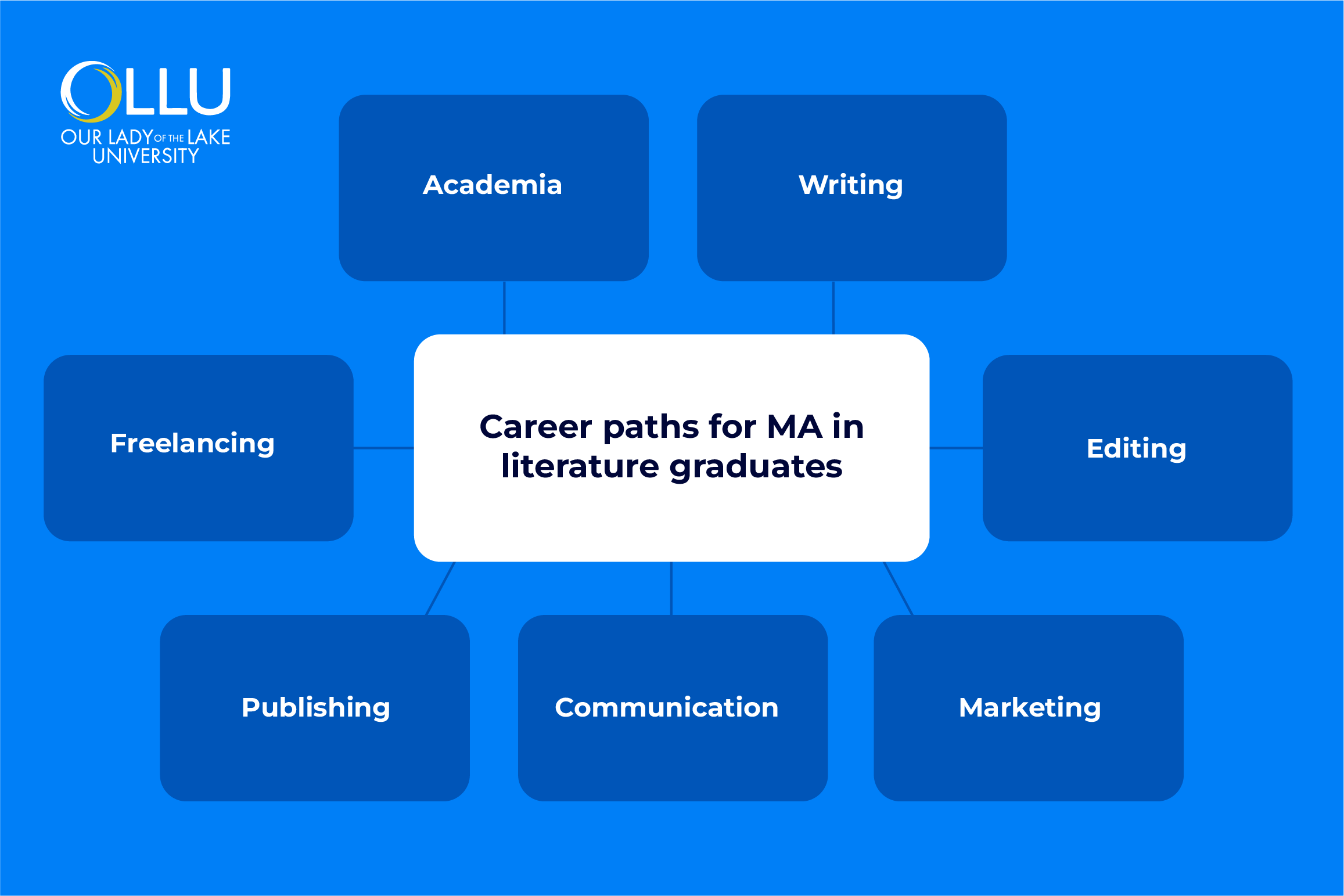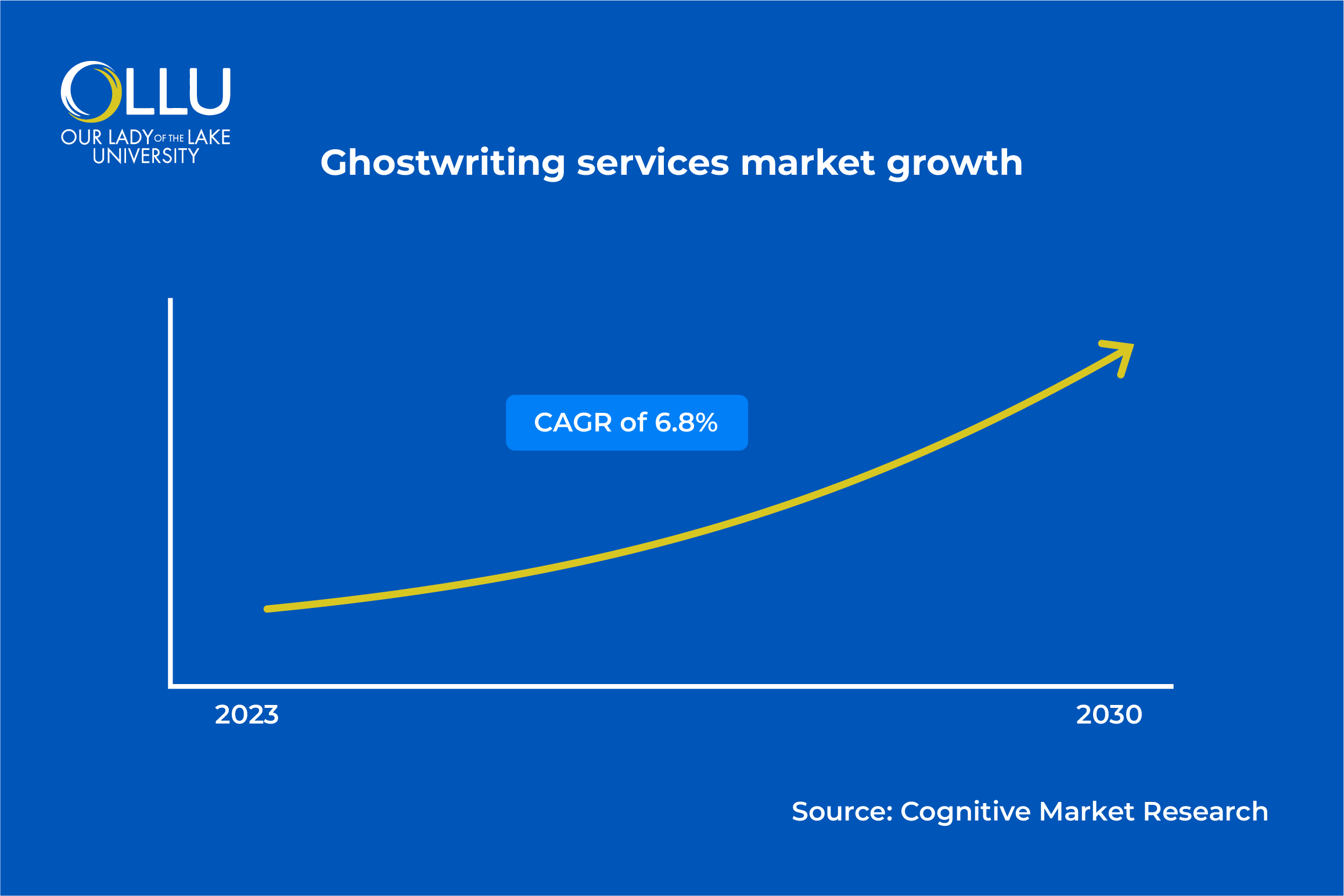From Academia to Freelancing: What Can I Do With an MA in Literature?
Jan 19, 2025

Key Takeaways
- The academic field offers a range of opportunities for MA in Literature graduates to work in different roles, teaching students or helping with the pedagogy in other ways.
- An MA in Literature significantly develops your writing and editing skills, opening doors to jobs such as author, content writer, editor, or ghostwriter.
- The global ghostwriting services market is projected to grow at a CAGR of 6.80% from 2023 to 2030.
- Literature graduates bring a special understanding of how to engage audiences through storytelling, making them particularly suitable for crafting posts, captions, and campaigns that capture attention and build loyalty.
- To make the most of your MA in literature, connect with faculty and fellow students to build your professional network, seek out internships, workshops, conferences, and literary events, and stay current with cultural trends.
Terry Eagleton, a literary critic, once noted, "What counts as literature is a notably unstable affair." For some, literature is simply books, poems, and other established written texts. Yet others, like Roland Barthes, argue that almost anything written, from advertisements to essays, can be viewed as literature.
And when so many forms of writing can fall under the umbrella of literature, it's no wonder that the question "What can I do with an MA in Literature?" has so many exciting answers, ranging from writing and editing to teaching and marketing.
Career Paths For MA In Literature Graduates

By focusing on helping students develop skills such as critical thinking, argumentation, effective communication, and advanced research, an MA in Literature can lead you to a variety of careers in education, publishing, communications, and other fields. Therefore, such a degree is highly versatile and an intellectually rewarding pursuit.
Academic and educational roles
One of the most established career paths for literature graduates is education. The academic field offers a range of opportunities to work in different roles, teaching students or helping with the pedagogy in other ways.
Teaching
Teaching English literature in high schools is one of the most common choices for those with an MA in Literature degree. In this role, you help students learn the basics of literature, from the classics to modern works. In Advanced Placement (AP) courses, however, you go in more depth in order to help the student develop college-level analytical and writing skills.
While many university positions require a PhD, an MA in Literature can still qualify you for some roles, such as adjunct professor or lecturer. These positions allow you to teach specialized courses in specific areas that align with your expertise, like Gothic Literature, Women's Writing, or Postcolonial Theory.
Other educational roles
An MA in Literature is relevant for other roles related to education, including curriculum development, in which you help design literature programs for schools, colleges, or even educational publishers.
Another option is to use your expertise in literature and the academic experience overall to become an academic advisor and help students interested in pursuing literature degrees make informed decisions about their education.
Writing and editing
An MA in Literature significantly develops your writing and editing skills. As a graduate, you become a valuable asset in roles that require precision, creativity, and attention to detail when producing compelling narratives and ensuring textual clarity.
Author
While it's true that many successful authors find their way into writing without formal education, an MA in Literature can still be a big help for those aspiring to publish. For students of literature, becoming an author themselves often feels like a natural progression after years of studying and analyzing the works of great writers.
However, it's important to acknowledge that becoming an author is also heavily tied to individual talent and passion. Not all MA Literature graduates necessarily want to focus on writing their own books. But, for those who do, an MA in Literature provides tools to help you craft richer and more advanced stories.
Content writer
Unlike authors who write primarily to publish books, content writers create diverse types of content, often for practical or promotional purposes. This role can encompass writing blogs, articles, website content, or crafting marketing materials for agencies, businesses, or media companies.
Content writing can also include technical writing—producing user manuals, product documentation, and how-to guides that require both clarity and a methodical approach. With an MA in Literature, graduates are well-equipped to navigate the creative and technical aspects of content writing, adapting their skills to suit different audiences and purposes.
Editor
Editing is an essential part of the writing process—ensuring that any text is clear, coherent, and impactful. An MA in Literature is particularly relevant for this career path, as it trains graduates to critically engage with texts, paying close attention to structure, tone, and meaning.
Literature graduates are highly valuable in roles like copy editing and developmental editing. They excel at transforming raw content into polished, professional pieces—whether refining manuscripts, academic papers, or marketing materials—due to their strong grasp of language and narrative structure.
Ghostwriter

Ghostwriting involves writing works for others to publish under their name, but it's far from being a mere compromise or fallback career. It's a collaborative process that helps individuals—such as public figures, entrepreneurs, or even other authors themselves—articulate their ideas in a more professional and engaging way.
In fact, ghostwriting has seen significant growth in recent years; according to Cognitive
Market Research, the global ghostwriting services market is projected to grow at a CAGR of 6.80% from 2023 to 2030.
A great example of modern ghostwriting is J.R. Moehringer's work on Prince Harry's memoir, "Spare." While Moehringer's role was not acknowledged on the book cover, it's common knowledge that he contributed to creating the narrative. So, though ghostwriting is sometimes discreet, it's always a deeply collaborative effort.
Marketing and communications
Literature graduates possess the ability to craft or at least differentiate narratives that resonate with the intended readers, adapt messages to a variety of audiences, and thoroughly analyze the information provided in the text. Therefore, they're suitable for various roles in marketing and communications.
Marketing coordinator
As a marketing coordinator, you would be in charge of planning campaigns and creating promotional content related to the brand message.
With an MA in Literature under your belt, you'd be exceptionally well-suited for this role as the program helps develop your abilities in research, synthesizing information, and using the best strategies to connect with audiences on an emotional and intellectual level.
Social media manager
As a social media manager, you would be responsible for creating and curating content, engaging with online communities, and driving brand awareness through digital platforms.
Literature graduates bring a special understanding of how to engage audiences through storytelling, making them particularly suitable for crafting posts, captions, and campaigns that capture attention and build loyalty.
Publishing and literary agencies
Working in the publishing world doesn't mean you are limited to being a writer or an editor. There are many other roles that put to good use the benefits of an MA in Literature, such as the ability to recognize potential in a manuscript, understanding an author's vision, and being able to differentiate a good text from a mediocre one.
Literary agent
Literary agents essentially act as intermediaries between authors and publishers, representing writers and negotiating book deals. This role involves scouting for talent, evaluating manuscripts, and advocating for clients.
Literature graduates are particularly suited for this role because of their ability to recognize quality writing as well as understand narrative potential.
Publishing manager
Publishing managers supervise the entire process of bringing a book to market, from production to marketing and distribution. Literature graduates with an MA are well-suited for this position because of their understanding of the author's perspective on the reader's experience.
Freelance work
Freelance work means offering your skills and services independently rather than working as a full-time employee for a single organization. It gives you the flexibility to choose your projects, set your own schedule, and work with a variety of clients.
Some of the most suitable freelance roles for literature graduates include:
Freelance writer
Freelance writing is incredibly versatile. Depending on the clients you work with, it can range from deeply personal pieces, like heartfelt memoirs or wedding vows, to lighthearted and fun projects, such as travel guides or pop culture articles.
As a freelance writer, you might work on ghostwriting projects, develop thought-leadership content for businesses, or contribute to magazines and websites on topics like literature, lifestyle, or technology. The ability to adapt your tone, style, and voice to various audiences, gained through a master's degree, will help make you an invaluable resource for clients.
Freelance editor
Freelance editing provides the same opportunities for detailed text refinement as traditional editing roles but with the added flexibility of choosing your clients and projects. As a freelance editor, you might work on academic papers, manuscripts, or business documents, offering services like copyediting for grammatical accuracy or developmental editing to improve structure and content.
This versatility allows you to collaborate with independent authors, self-publishing writers, or businesses in need of polished and professional materials.
How to Make the Most of Your MA in Literature
Although the graduating-with-an-MA-in-literature part itself does so much for you in terms of career opportunities, there are also certain things you can do to help enhance those opportunities even more.
One way is to actively connect with faculty and fellow students. Engaging in discussions, collaborating on projects, or even simply participating in group activities can help build your professional network—something you will need in any industry. Moreover, seek out internships, workshops, conferences, and literary events. These settings are ideal for developing skills, sharing knowledge, and staying informed on trends in the literary world.
Lastly, remember that literature, for the most part, doesn't exist in isolation. It's actually deeply connected to society. Therefore, reading and staying current with cultural trends will help you better understand the influence and importance of literary works.
The Bottom Line
Literature can be found everywhere in our daily lives—from books to speeches, articles, and digital media. So, it's not just about "what can you do with a master's in English literature," but rather, what do you want to do? The possibilities are endless—from research and academia to content creation and beyond.
So, are you ready to turn the page to your next chapter? Check out OLLU's English Literature programs, and we will write the story together.
Frequently Asked Questions (FAQs)
Can I pursue a PhD after completing an MA in literature?
Absolutely! An MA in Literature is actually often a prerequisite for pursuing a PhD program in the same or related field.
How long does it take to get a master's degree in literature?
Typically, it takes about two years to complete a master's degree in literature if you are studying full-time.